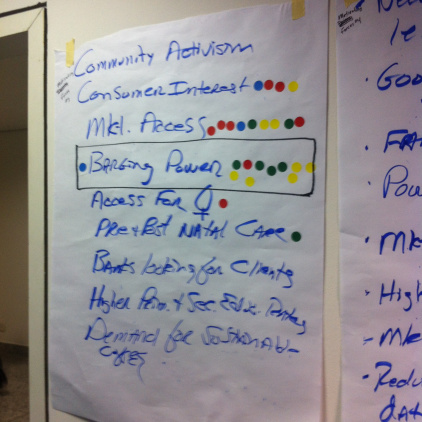by Miguel Zamora of Coffee Gente
Last month, I attended the International Coffee Organization’s 3rd Coffee Finance Forum in Brazil during ICO’s 50th anniversary meeting. ICO meetings are open to country delegates, observers and guests from 70 countries, both producing and consuming countries. The objective was to identify best practices and disseminate information to members about farmer aggregation (farmers working together and creating farmer organizations) as a platform to better access financing and risk management.
I was excited to participate in this forum, since farmer aggregation and supporting farmer organizations has been a significant focus of my work for the past 13 years. Farmer aggregation could be the biggest development opportunity we have in coffee. Since most of the coffee farmers in the world are smallholders who are not part of effective farmer organizations, these farmers are missing on those advantages that farmer organizations could bring to smallholders: access to cheaper inputs, access to credit, access to services and support from governments and NGO’s, access to information (about the market, buyers’ expectations), access to ‘better’ markets (closer relationships with buyers, potentially better price to farmers due to less links in the chains).
Related Reading
New Study: Smallholder Farmers Need Better Record-Keeping for Bank Loans
Exploring the Economic Impacts of Microlots with Counter Culture, Stumptown and Intelligentsia
In addition, the coffee industry could benefit of building more sustainable supply chains that secure coffee for the future. Farmer aggregation could also increase traceability and improve quality of coffee. Once farmer organizations support farmers with the right information and training, and implement better quality control for the coffee from their members, this coffee that used to be processed in sub-optimal conditions and traded by many intermediaries could potentially reach the consuming markets with higher quality and could be traced to a specific community.
The focus of the ICO session was on:
- Organizing independent smallholders (aggregation of small farmers)
- Strengthening farmer organizations (with an emphasis on co-ops)
We first discussed a series of case studies that had been developed by ICO/World Bank with information from farmer organizations from Latin America and Africa.
The case studies described different farmer organizations at different stages (formation, consolidation, growth, etc). It was a great exercise because it recognized the different stages that farmers go through when they try to work together. Unfortunately, in many cases, different development initiatives treat farmer organizations as “one size fits all,” which leads to wrong approaches when we realize that the opportunities and challenges for a group of farmers just beginning to work together will be very different than those of a farmer organization with thousands of members that may have been working together for decades. For example, a few farmer organizations successfully use hedging (futures, options) to mitigate risk from changes in prices. However, many farmer organizations will find other price risk management techniques that will be more appropriate and effective for their specific situations. Being able to recognize that one size does not fit all will help development organizations and governments provide more effective support for smallholder coffee farmers around the world.
After we discussed the studies, representatives from most of the ICO members (co-op leaders, governmental organizations from producing countries) and NGO representatives identified and discussed forces that influence farmer aggregation, positively or negatively. Then the representatives prioritized those forces into the following:
Driving Forces
- Market mechanisms that incentivize aggregation
- Examples of success: co-ops and farmer organizations that have succeeded
- Management and Leadership Skills – training and support
Restraining Forces
- Lack of participation among women in farmer organizations
- Lack of education about co-ops and farmer organizations
- Poor legal framework in place for farmer organizations + corruption
- Risk adversity of managers/members
The remainder of the day focused on trying to identify initiatives that ICO and its members could take to support the driving forces and remediate the restraining ones. For example, in the first driving force, we discussed creating market incentives for organizing farmers. Some of the ideas identified for working on this force included:
- Working with coffee buyers so they can send the message (and create incentives) that smallholders will be better off if they are organized. If farmers get organized and meet the buyers’ standards, there is a market for them.
- Getting buyers involved could also help us to bring the finance sector to the table and support those smallholders in organizations to access the finance they need
- Collaboration with “certifiers” could help with information sharing that financing entities and farmer organizations need to work together
- Sharing more information on how existing market mechanisms incentivize farmer aggregation
In the next months, ICO will begin trying to implement some of these recommendations, which could be adopted by local governments, development organizations and coffee buyers to support smallholders to create farmer organizations and improve the overall long-term sustainability of the coffee industry. Form my perspective, it was encouraging and commendable to see the ICO and its members discuss farmer aggregation and recognize its potential to support the livelihoods of millions of smallholders that depend on coffee production.
Nick Brown
Nick Brown is the editor of Daily Coffee News by Roast Magazine.







Comment